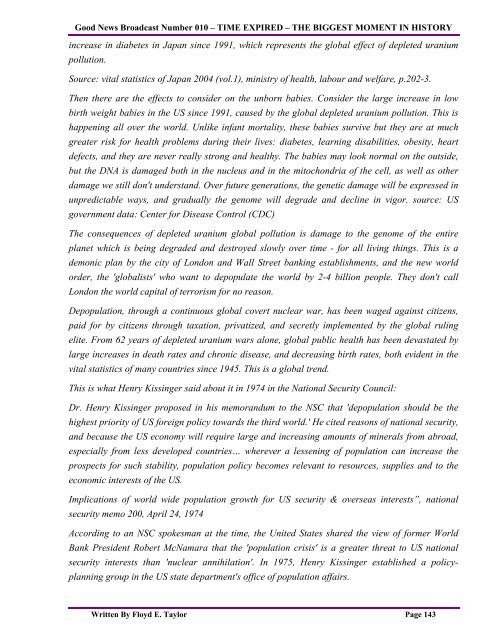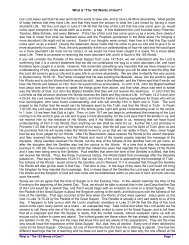TIME EXPIRED, The Biggest Moment in History - The Pure ...
TIME EXPIRED, The Biggest Moment in History - The Pure ...
TIME EXPIRED, The Biggest Moment in History - The Pure ...
You also want an ePaper? Increase the reach of your titles
YUMPU automatically turns print PDFs into web optimized ePapers that Google loves.
Good News Broadcast Number 010 – <strong>TIME</strong> <strong>EXPIRED</strong> – THE BIGGEST MOMENT IN HISTORY<strong>in</strong>crease <strong>in</strong> diabetes <strong>in</strong> Japan s<strong>in</strong>ce 1991, which represents the global effect of depleted uraniumpollution.Source: vital statistics of Japan 2004 (vol.1), m<strong>in</strong>istry of health, labour and welfare, p.202-3.<strong>The</strong>n there are the effects to consider on the unborn babies. Consider the large <strong>in</strong>crease <strong>in</strong> lowbirth weight babies <strong>in</strong> the US s<strong>in</strong>ce 1991, caused by the global depleted uranium pollution. This ishappen<strong>in</strong>g all over the world. Unlike <strong>in</strong>fant mortality, these babies survive but they are at muchgreater risk for health problems dur<strong>in</strong>g their lives: diabetes, learn<strong>in</strong>g disabilities, obesity, heartdefects, and they are never really strong and healthy. <strong>The</strong> babies may look normal on the outside,but the DNA is damaged both <strong>in</strong> the nucleus and <strong>in</strong> the mitochondria of the cell, as well as otherdamage we still don't understand. Over future generations, the genetic damage will be expressed <strong>in</strong>unpredictable ways, and gradually the genome will degrade and decl<strong>in</strong>e <strong>in</strong> vigor. source: USgovernment data: Center for Disease Control (CDC)<strong>The</strong> consequences of depleted uranium global pollution is damage to the genome of the entireplanet which is be<strong>in</strong>g degraded and destroyed slowly over time - for all liv<strong>in</strong>g th<strong>in</strong>gs. This is ademonic plan by the city of London and Wall Street bank<strong>in</strong>g establishments, and the new worldorder, the 'globalists' who want to depopulate the world by 2-4 billion people. <strong>The</strong>y don't callLondon the world capital of terrorism for no reason.Depopulation, through a cont<strong>in</strong>uous global covert nuclear war, has been waged aga<strong>in</strong>st citizens,paid for by citizens through taxation, privatized, and secretly implemented by the global rul<strong>in</strong>gelite. From 62 years of depleted uranium wars alone, global public health has been devastated bylarge <strong>in</strong>creases <strong>in</strong> death rates and chronic disease, and decreas<strong>in</strong>g birth rates, both evident <strong>in</strong> thevital statistics of many countries s<strong>in</strong>ce 1945. This is a global trend.This is what Henry Kiss<strong>in</strong>ger said about it <strong>in</strong> 1974 <strong>in</strong> the National Security Council:Dr. Henry Kiss<strong>in</strong>ger proposed <strong>in</strong> his memorandum to the NSC that 'depopulation should be thehighest priority of US foreign policy towards the third world.' He cited reasons of national security,and because the US economy will require large and <strong>in</strong>creas<strong>in</strong>g amounts of m<strong>in</strong>erals from abroad,especially from less developed countries… wherever a lessen<strong>in</strong>g of population can <strong>in</strong>crease theprospects for such stability, population policy becomes relevant to resources, supplies and to theeconomic <strong>in</strong>terests of the US.Implications of world wide population growth for US security & overseas <strong>in</strong>terests”, nationalsecurity memo 200, April 24, 1974Accord<strong>in</strong>g to an NSC spokesman at the time, the United States shared the view of former WorldBank President Robert McNamara that the 'population crisis' is a greater threat to US nationalsecurity <strong>in</strong>terests than 'nuclear annihilation'. In 1975, Henry Kiss<strong>in</strong>ger established a policyplann<strong>in</strong>ggroup <strong>in</strong> the US state department's office of population affairs.Written By Floyd E. Taylor Page 143









